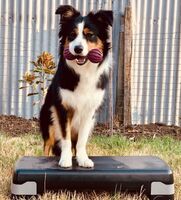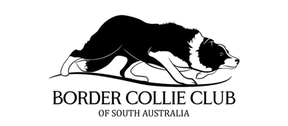
The general guideline for the activity requirements of the energetic adult Border Collie is that they need daily physical and mental exercise. This often leads people to believe that a Border Collie needs to walk or run long distances every day, or constantly have something to do otherwise they will get crazy and destructive. This is not the case, but the devil is in the details. Exercise is absolutely important HOWEVER a common mistake made by owners is to actually over-stimulate their dogs. A high energy breed does not automatically require high energy exercise. Some dogs can react to the adrenaline in such a way that they become 'exercise junkies' and the more they do, the more they need, to the point where tiring them out becomes impossible. Do your research and pick your breeder carefully as some lines are more placid (low-drive) and others are extremely ready to go (high-drive).
Either end of the spectrum, one of the best things you can do from the beginning is teach your dog to 'switch off' or settle. This means simply giving treats and rewarding the dog often for being relaxed and still. Try not to develop a routine such as going for a walk at the same time every day, be unpredictable and break up the various activities you do with your dog and keep them guessing, some days you may be too busy to do anything at all, you or your dog may be injured, or other circumstances may arise that impact upon your routine and they need to be able to handle that instead of you having a dog stressing about a missed deadline or creating their own stimulation by chasing cars or running tracks along your fence. Avoid or limit repetitive, adrenaline-boosting games like ball chasing which can quickly turn into a fixation.
The strongest argument that can be made for teaching your dog to be calm and relaxed is in the case of an injury or illness when they need to be kept quiet and still. Imagine a dog who expects a 10km run at 5:30pm each night suddenly being confined to the lounge or a crate for three weeks! Border Collies should be ready and willing to go and work when they are asked - but only when they are asked. Bred for endurance work on a farm, a farmer still does not need a dog that is bouncing off the walls 24/7 - they just need a dog that will go and do a job when it is asked and then settle down until it's time for the next job. Consider incorporating obedience, trick training and food dispensing toys into your 'exercise' regime and allow periods of absolutely nothing as well. Your home, your yard and your dog will benefit!
There are a number of Dog Sports available within Australia, and Border Collies are allowed to compete in most of them. Being such a versatile and intelligent breed, they also usually excel in them, however before considering the higher impact sports, please familiarise yourselves with the kinds of injuries that dogs are susceptible to with movements such as fast turns, sudden stops and jumping. Overweight dogs are at particular risk so it is always a good idea to increase your dog's fitness gently before diving into competition. Hip, Elbow and Shoulder Scoring should be done by your breeders with your dog's parents, however if you are planning to compete in sports it is worth undertaking yourself with your own dog to have an idea of their structure and whether competing will be safe. Below you will also find specific guidelines regarding puppy exercise to start off on the right track.
Either end of the spectrum, one of the best things you can do from the beginning is teach your dog to 'switch off' or settle. This means simply giving treats and rewarding the dog often for being relaxed and still. Try not to develop a routine such as going for a walk at the same time every day, be unpredictable and break up the various activities you do with your dog and keep them guessing, some days you may be too busy to do anything at all, you or your dog may be injured, or other circumstances may arise that impact upon your routine and they need to be able to handle that instead of you having a dog stressing about a missed deadline or creating their own stimulation by chasing cars or running tracks along your fence. Avoid or limit repetitive, adrenaline-boosting games like ball chasing which can quickly turn into a fixation.
The strongest argument that can be made for teaching your dog to be calm and relaxed is in the case of an injury or illness when they need to be kept quiet and still. Imagine a dog who expects a 10km run at 5:30pm each night suddenly being confined to the lounge or a crate for three weeks! Border Collies should be ready and willing to go and work when they are asked - but only when they are asked. Bred for endurance work on a farm, a farmer still does not need a dog that is bouncing off the walls 24/7 - they just need a dog that will go and do a job when it is asked and then settle down until it's time for the next job. Consider incorporating obedience, trick training and food dispensing toys into your 'exercise' regime and allow periods of absolutely nothing as well. Your home, your yard and your dog will benefit!
There are a number of Dog Sports available within Australia, and Border Collies are allowed to compete in most of them. Being such a versatile and intelligent breed, they also usually excel in them, however before considering the higher impact sports, please familiarise yourselves with the kinds of injuries that dogs are susceptible to with movements such as fast turns, sudden stops and jumping. Overweight dogs are at particular risk so it is always a good idea to increase your dog's fitness gently before diving into competition. Hip, Elbow and Shoulder Scoring should be done by your breeders with your dog's parents, however if you are planning to compete in sports it is worth undertaking yourself with your own dog to have an idea of their structure and whether competing will be safe. Below you will also find specific guidelines regarding puppy exercise to start off on the right track.
Puppy Exercise Guidelines
Whilst musculoskeletal injuries can happen at any time, growing puppies are at particular risk due to their immature joints, bones and decision making processes. It is imperative that you ensure that your puppy does not engage in high risk activities such as fast turns, sudden stops, jumping (particularly on or off furniture), running up or down stairs (particularly ones with limited traction) and rough play with other dogs. Their exercise requirements are far less than adult dogs - a good rule to remember is that a puppy should exercise for no longer than 5 minutes per month of age. For example, a 3 month old puppy shouldn't go for a walk longer than 15 minutes, whilst a 9 month old puppy could be increased to up to 45 minutes - if there is any resistance on the puppy's part to go further at any time you should stop, however with Border Collies we usually find that we have to stop them!
© Border Collie Club of South Australia Inc. 2025
